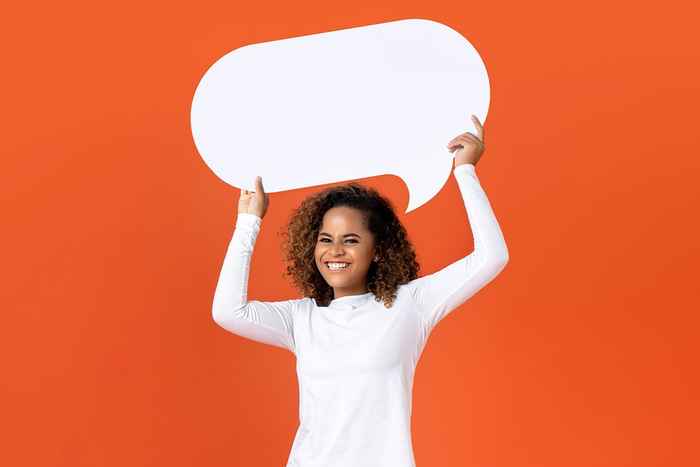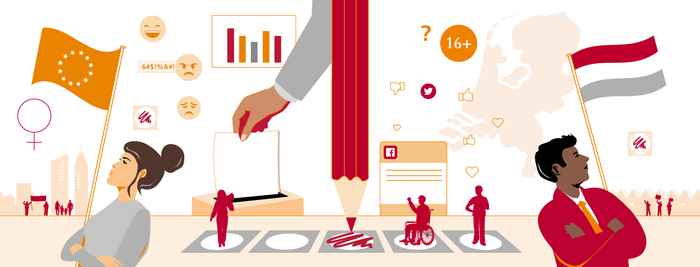'Why voting at the age of 16 is a good idea'
6 November 2023

Better guidance
"During adolescence, roughly between the ages of 13 and 18, you develop democratic norms and values, as well as your key political beliefs. This is also the period in your life when your political engagement is shaped. However, at this age, you have limited opportunities to express this engagement because you cannot vote yet. Research shows that lowering the voting age makes it easier to encourage this involvement. In schools, for example."
Lowering the voting age can lead to higher voter turnout in the futureSarah de Lange
"Young people gain experience with political participation during a formative phase in their lives, increasing the likelihood that they will actually vote later on. Research also tells us that those who vote for the first time when they become eligible to do so are more likely to vote in subsequent elections. Therefore, raising youth voter turnout through a lower voting age can lead to higher overall voter turnout in the future. This is a compelling argument for granting 16- and 17-year-olds the right to vote."
"There's another reason to allow young people to vote at 16. Nowadays, young people and older generations often hold different views on political issues. But because young people cannot vote, their perspectives are inadequately represented in politics. Lowering the voting age can improve their representation."
Addressing political inequality
"Lowering the voting age also provides opportunities to address political inequality between higher and lower educated young people. Currently, lower educated young people vote less frequently and have lower political self-confidence. For instance, in the 2017 elections, 80% of highly educated young people voted, compared to 60% of the less educated. This is a significant difference and a cause for concern."
"Lower educated young people believe in our democratic system but feel that politics isn't for them. As a result, they feel a significant distance from political parties and politicians. In the short term, this disconnect leads to voter apathy, with young people not participating in elections. In the long term, it can lead to political radicalization, as young people may become active outside the bounds of democracy, for example, on extremist online platforms."
"By involving these young people in politics at age 16, you have greater influence on them. You engage them in the political process at a time when their democratic norms and values are being developed, and their political self-confidence can be bolstered. Additionally, they are all still in school, making it possible to reach them through education."
Education plays significant role
"Education plays a significant role in the political development of all young people. At the age of 18, the current voting age, you are at your least anchored. You have often just started at a new study, begun working, established new friendships, or moved away from home. Your connection with all the institutions and individuals crucial to your political socialization becomes more tenuous. However, at 16, you are still subject to compulsory education and attend school, where you acquire knowledge about politics through mandatory subjects like civics, and your civic skills are developed. This helps you understand the value of your vote and equips you better for voting."
"In addition to education, there are other ways to involve young people in politics. For example, opening polling stations in schools to make voting more accessible or using youth workers who can reach out to young people, especially those with lower education."
"At the same time, there are measures with uncertain effects. For instance, in some municipalities, the mayor sends a personal letter to young people eligible to vote for the first time to encourage them to participate in elections. While this is a well-intentioned effort, it's unclear whether it effectively increases the voter turnout."
Arguments against lowering the voting age
"Often, it's argued that 16-year-olds are not ready to vote at all. It's claimed that their adolescent brains make them too impulsive. Research shows that while teenagers can have intense conflicts with their parents and react emotionally to issues bothering them, this impulsivity hardly plays a role when they cast their votes. They make 'cold decisions,' well-considered and content-driven."
"We know that 16-year-olds vote based on substantial considerations, as evidenced by research from Austria, where 16- and 17-year-olds have been voting since 2007. The quality of their voting motivations does not differ from those of older voters. They are equally influenced by the substantive positions of political parties."
Amending the constitution
"Changing the voting age isn't easy since it's enshrined in the constitution. The proposal from the Council for Public Administration is to remove the age requirement from the constitution to allow for experimentation at the municipal level. Several Dutch political parties support this proposal and have included lowering the voting age in their election programs, such as Green Left, the Labour Party, and D66. Unfortunately, there is no political majority for our proposal, but we are hopeful that it will gain support in the long term."
Upcoming elections
"Young people who are voting for the first time are often inclined to support newer parties. They tend to be more open to the range of political parties available than older voters. However, they seem less enthusiastic about certain parties like BBB and NSC compared to parties that emerged in previous elections, such as FvD and Volt. Also, certain parties align better with the societal issues that concern young people, such as climate change, immigration, or racism. Theopinion young people hold on these issues are influenced in part by their level of education. In recent polls, the GreenLeft and Labour Party alliance is by far the most popular among young voters."
Generational differences
De Lange is conducting research on the voting behavior of younger generations versus older ones, along with fellow political scientist Wouter van der Brug and a group of PhD students. "We already know that voting behavior differs between these groups. It's not surprising, for instance, that young people are more likely to vote for green parties. However, the factors influencing the voting behavior of young people may be different from those of older voters. We hypothesize that older generations were socialized during a time of class and religious divisions, while young people are becoming politically mature in an era of polarization and social-cultural differences. As a result, other issues likely influence their voting behavior."
Parents influence their children, but surprisingly, children also influence their parentsSarah de Lange
"The initial results of this project, a sub-study by our PhD student Linet Durmuşoğlu on the dynamics between parents and their children, show a surprising outcome. Parents are just as influenced in their beliefs and voting preferences by their children as children are by their parents. We are now investigating whether this is related to how often parents and their children discuss politics at home."
